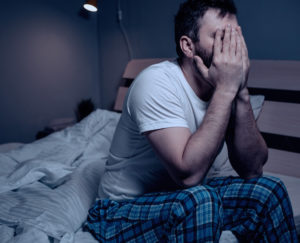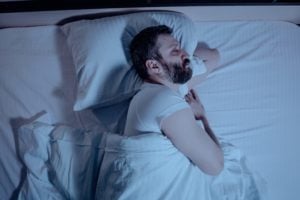Eating Disorders and Sleep
Eating disorders affect over 30 million people in the United States and can cause significant physical and mental distress. Sleep plays a vital role in both emotional and physical health, and a growing amount of evidence shows a connection between sleep and eating disorders.
Knowing about the ties between sleep and eating disorders can help people affected by these disorders better understand their condition. In some cases, enhancing sleep may provide an opportunity to feel better and even reduce eating disorder symptoms.
What Are Eating Disorders?
Eating disorders are mental health conditions that involve abnormal eating behavior . These behaviors are frequently associated with problematic thoughts or feelings about food, weight, and/or body image.
Millions of people in the United States are affected by eating disorders. Anyone can have an eating disorder, but they are most common in women and in teens and young adults .
There are many types of eating disorders. The most common eating disorders are binge eating disorder, bulimia nervosa, and anorexia nervosa. Night eating syndrome is the eating disorder that most directly affects sleep, although all eating disorders can interact with sleep.
Binge Eating Disorder
Binge eating disorder is the most common eating disorder . It is estimated to affect around 2.8% of people at some point during their life.
People with binge eating disorder experience out-of-control eating. Episodes often involve eating large amounts in a short time and continuing to eat despite feeling full. Binge eating can cause discomfort and feelings of shame and guilt. Binge eating disorder can occur in people of any size, but is most common in people who are overweight or obese .
Bulimia Nervosa
Like people with binge eating disorder, people with bulimia nervosa have episodes of out-of-control consumption of large amounts of food. Afterward, people with this disorder use purging behavior — vomiting, exercising excessively, using laxatives or water pills, or fasting — to try to counteract the binge eating.
Bulimia nervosa is believed to affect about 1% of people during the course of their life. It can cause serious health consequences resulting from consistent vomiting and other purging behaviors. Depending on their specific circumstances, people with bulimia nervosa can be somewhat underweight, average weight, or overweight.
Anorexia Nervosa
Anorexia nervosa is an eating disorder that involves significant reduction of food consumption related to an extreme pursuit of being thin. Even when they are considerably underweight, people with anorexia commonly think of themselves as overweight.
There are two types of anorexia nervosa . The restrictive type involves major restrictions on food intake. The binge-purge type also involves restricting intake but includes behaviors like vomiting or using laxatives to try to maximize weight loss.
Insufficient food consumption can lead to serious and life-threatening malnourishment. Among all mental health disorders, anorexia nervosa has the highest death rate. Studies estimate that around .6% of people experience anorexia nervosa at some point during their life.
Night Eating Syndrome
Night eating syndrome is a disorder that is believed to affect around 1.5% of people . People with this condition eat between 25-50% of their daily calories after dinner. They are normally not hungry in the morning but feel a strong urge to eat at night.
Insomnia is a typical symptom among people with night eating syndrome. Waking up multiple times in the night is common, and eating may be seen as necessary to getting back to sleep.
Night eating syndrome is associated with obesity. It often causes emotional distress , such as shame or guilt, and its sleep interruptions can cause daytime drowsiness and impairment.
Night eating syndrome is believed to be connected to a misaligned circadian rhythm. Circadian rhythm is a person’s internal clock that helps control a broad range of bodily functions.

What Causes Eating Disorders?
The exact cause of eating disorders is unknown, but they are believed to be linked to a combination of genetic, environmental, social, and other factors.
It is important to emphasize that eating disorders are not a result of lifestyle choices. Instead, they are medical conditions with complicated biological underpinnings.
Some eating disorders appear to run in families, which suggests a possible genetic predisposition in certain cases. Social and cultural pressures, concerns about body image, and other emotional struggles may influence the risk of developing an eating disorder.
What’s the Relationship Between Sleep and Eating Disorders?
Many research studies have identified a significant overlap between sleeping problems and eating disorders. Not everyone with poor sleep has an eating disorder, and not all people with eating disorders have problems sleeping. Nevertheless, these issues arise together at a rate that strongly indicates an association between them.
Many experts believe that eating disorders and sleep have a bidirectional relationship . This means that eating disorders can negatively affect sleep and that sleep disruptions can contribute to the symptoms of eating disorders.
Some examples of this bidirectional relationship include:
- Analysis of over 500 college-aged women found that 25-30% of those with diagnosed eating disorders had insomnia symptoms compared to only 5% of those without eating disorders.
- Diagnosis of an eating disorder was predictive of sleeping problems over a long-term period of seven years in an observational study of over 12,000 young adults.
- Having sleeping problems along with an eating disorder has been tied to more severe eating disorder symptoms and a worse response to treatment.
- Purging behaviors have been linked to worsened sleep quality as well as symptoms of daytime impairment. The physical effects of these behaviors may create difficulties both in falling asleep and staying asleep.
- Multiple studies have observed poor sleep in people with anorexia nervosa including more sleep disruptions, lower sleep quality, and less time spent in restorative deep sleep and REM sleep stages.
- People with binge eating disorder have been found to have higher rates of short sleep duration in observational research.
- A study of pregnant women found that those with binge eating disorder suffered significantly more sleeping problems during pregnancy.
- Night eating syndrome frequently occurs with insomnia. The condition is believed to be strongly linked to circadian rhythm disruptions that can influence sleep.
Although more studies are needed to expand the scientific understanding of the relationship between sleep and eating disorders, the existing body of research points to numerous connections that can be of importance to both patients and health care providers.
What Is the Cause of the Relationship Between Eating Disorders and Sleep?
There is still much that is unknown about sleep, eating disorders, and the connections between them. The mental and physical processes underlying sleep, nutrition, and mental health are extremely complex, which makes it challenging to definitively know what drives their relationship.
That said, researchers have advanced several ideas for how sleep and eating disorders may influence one another:
- Mental health disorders like depression and anxiety may contribute to the relationship between eating disorders and sleep. Between 42% and 80% of people with anorexia nervosa, bulimia nervosa, and binge eating disorder also have a mood or anxiety disorder. These mental health conditions often affect sleep and vice versa.
- Food intake patterns and nutrient consumption may influence both sleep quality and daytime sleepiness. Malnutrition in anorexia nervosa impacts brain function, including the production of chemicals and hormones that control sleep and wakefulness.
- Sleep is directly involved in the normal production of hormones that regulate appetite and hunger. Disturbed sleep may throw off these hormone levels and alter eating behavior.
- Behaviors tied to eating disorders, such as purging or excessive exercise, may drive changes to sleep habits or hinder the ability to sleep normally.
- Disruptions of circadian rhythm can give rise to night eating syndrome and may also be connected to abnormal eating in other disorders.
- Medications prescribed to help treat eating disorders and related mental health conditions may have an effect on sleep quantity and quality.
Many of these factors could be involved in any individual’s case, and additional research is needed to clarify the central elements that drive the link between eating disorders and sleep.
Sleep Disorders That Affect Eating
In addition to eating disorders that are tied to sleep, there are some sleep disorders that affect eating.
Sleep-related eating disorder (SERD) is a condition in which a person rises from bed and eats during sleep. In these episodes, the person remains in a sleep-like state and is not aware of their behavior. As a result, they may consume rancid food or hazardous materials.
Like sleepwalking or sleep talking, SERD is a type of abnormal behavior sleep disorder known as a parasomnia. Although it may be confused with night eating syndrome, SERD is distinguished by the person’s lack of awareness when eating.
Other sleep disorders may also influence eating patterns. Disorders involving sleep deprivation may interfere with hormones that control appetite. Not getting the sleep you need can also influence brain function in ways that alter impulse control and food choice .
Getting Help With Sleep and Eating Disorders
There is hope for people with eating disorders. Various types of treatment can reduce or even eliminate symptoms, and steps to enhance sleep may boost the effectiveness of those treatments.
What Are the Treatments for Eating Disorders?
Treatment for eating disorders is usually coordinated by a doctor and/or psychiatrist. Treatment can be tailored to fit the patient’s situation and may involve one or more different approaches.
Counseling is frequently a core element of treatment. For example, cognitive behavioral therapy (CBT) is a method that helps examine and reorient negative thinking that can give rise to unwanted behavior. Other types of behavioral therapies can involve family members and establishing new routines that promote healthier eating habits.
Medications may also be prescribed that can help treat the symptoms of mental health disorders that often arise with eating disorders. Reducing depression and/or anxiety in this way can have positive effects on the severity of eating disorders.
People with eating disorders can also get support from family members, friends, and through organizations and support groups. For many patients, support can reduce the stigma associated with eating disorders and enable them to more effectively cope with or address the condition.
How Can People With Eating Disorders Improve Their Sleep?
Because sleep is fundamental to virtually all aspects of health , it’s almost always beneficial to commit to getting better sleep. For people with eating disorders, improved sleep may offer even more benefits through a positive effect on their symptoms.
An initial step is to describe any sleeping difficulties to your doctor or psychiatrist. Some symptoms could be a sign of an underlying sleep disorder that can be directly addressed to enhance sleep.
Another step to obtaining better sleep is upgrading your sleep hygiene. This means building healthy sleep habits and designing your bedroom to be conducive to high-quality sleep. Although there are many ways to step up your sleep hygiene, some important elements include:
- Using the same bedtime and wake-up time every day, including on weekends
- Preparing for bed with the same routine each night
- Avoiding screen time for at least 30 minutes before bed and avoiding the urge to check your phone while in bed
- Outfitting your bedroom with a high-quality mattress and bedding that makes your bed inviting
- Taking steps to make sure that your sleep isn’t disrupted by light, noise, or an uncomfortable bedroom temperature.
For people with night eating syndrome, early-stage studies have shown potential benefits from light therapy , which uses a special lamp to mimic daylight and provide a dose of concentrated light in the morning.
The goal of light therapy is to positively affect circadian rhythm, which is closely linked to light exposure. Light therapy is also used to treat some mood disorders, such as seasonal affective disorder.
More research is needed to establish what role, if any, light therapy has in treating night eating syndrome. For this reason, anyone interested in this approach should talk with their doctor about the benefits and risks before beginning light therapy.

Still have questions? Ask our community!
Join our Sleep Care Community — a trusted hub of sleep health professionals, product specialists, and people just like you. Whether you need expert sleep advice for your insomnia or you’re searching for the perfect mattress, we’ve got you covered. Get personalized guidance from the experts who know sleep best.
References
25 Sources
-
MedlinePlus: National Library of Medicine (US). (2020, May 13). Eating disorders. MedlinePlus., Retrieved February 24, 2021, from
https://medlineplus.gov/eatingdisorders.html -
Striegel-Moore, R. H., Rossellini, F., Perrin, N., DeBar, L., Wilson, G. T., May, A., & Kraemer, H. C. (2009). Gender difference in the prevalence of eating disorder symptoms. International Journal of Eating Disorders, 42(5), 471-474.
https://pubmed.ncbi.nlm.nih.gov/19107833/ -
Smink, F. R. E., van Hoeken, D., & Hoek, H. W. (2012). Epidemiology of eating disorders: Incidence, prevalence and mortality rates. Current Psychiatry Reports, 14(4), 406-414.
https://pubmed.ncbi.nlm.nih.gov/22644309/ -
National Institute of Mental Health. (2016, February). Eating disorders., Retrieved February 24, 2021 from
https://www.nimh.nih.gov/health/topics/eating-disorders/index.shtml -
National Institute of Mental Health. (2017, November). Eating disorders., Retrieved February 24, 2021 from
https://www.nimh.nih.gov/health/statistics/eating-disorders.shtml -
De Zwaan, M. (2001). Binge eating disorder and obesity. International Journal of Obesity and Related Metabolic Disorders, 25(Suppl 1), S51-55.
https://pubmed.ncbi.nlm.nih.gov/11466589/ -
National Institute of Mental Health. (2018). Eating disorders: About more than food., Retrieved February 24, 2021 from
https://www.nimh.nih.gov/health/publications/eating-disorders/index.shtml -
Geliebter, A., McOuatt, H., Tetreault, C. B., Kordunova, D., Rice, K., Zammit, G., & Gluck, M. (2016). Is night eating syndrome associated with obstructive sleep apnea, BMI, and depressed mood in patients from a sleep laboratory study?. Eating Behaviors, 23, 115–119.
https://pubmed.ncbi.nlm.nih.gov/27643566/ -
Youdim, A. (2020, January). Obesity. Merck Manual Professional Version., Retrieved February 24, 2021, from
https://www.msdmanuals.com/professional/nutritional-disorders/obesity-and-the-metabolic-syndrome/obesity -
Allison, K. C., & Tarves, E. P. (2011). Treatment of night eating syndrome. The Psychiatric Clinics of North America, 34(4), 785–796.
https://pubmed.ncbi.nlm.nih.gov/22098804/ -
Allison, K. C., Lundgren, J. D., O’Reardon, J. P., Geliebter, A., Gluck, M. E., Vinai, P., Mitchell, J. E., Schenck, C. H., Howell, M. J., Crow, S. J., Engel, S., Latzer, Y., Tzischinsky, O., Mahowald, M. W., & Stunkard, A. J. (2010). Proposed diagnostic criteria for night eating syndrome. The International Journal of Eating Disorders, 43(3), 241–247.
https://pubmed.ncbi.nlm.nih.gov/19378289/ -
National Alliance on Mental Illness. (n.d.). Eating disorders.
https://www.nami.org/About-Mental-Illness/Mental-Health-Conditions/Eating-Disorders -
Allison, K. C., Spaeth, A., & Hopkins, C. M. (2016). Sleep and eating disorders. Current Psychiatry Reports, 18(10), 92.
https://pubmed.ncbi.nlm.nih.gov/27553980/ -
Aspen, V., Weisman, H., Vannucci, A., Nafiz, N., Gredysa, D., Kass, A. E., Trockel, M., Jacobi, C., Wilfley, D. E., & Taylor, C. B. (2014). Psychiatric co-morbidity in women presenting across the continuum of disordered eating. Eating Behaviors, 15(4), 686–693.
https://pubmed.ncbi.nlm.nih.gov/25462028/ -
Nagata, J. M., Thurston, I. B., Karazsia, B. T., Woolridge, D., Buckelew, S. M., Murray, S. B., & Calzo, J. P. (2020). Self-reported eating disorders and sleep disturbances in young adults: a prospective cohort study. Eating and Weight Disorders. 10.1007/s40519-020-00888-6. Advance online publication.
https://pubmed.ncbi.nlm.nih.gov/32222955/ -
Kim, K. R., Jung, Y. C., Shin, M. Y., Namkoong, K., Kim, J. K., & Lee, J. H. (2010). Sleep disturbance in women with eating disorder: prevalence and clinical characteristics. Psychiatry research, 176(1), 88–90.
https://pubmed.ncbi.nlm.nih.gov/20071034/ -
Tanahashi, T., Kawai, K., Tatsushima, K., Saeki, C., Wakabayashi, K., Tamura, N., Ando, T., & Ishikawa, T. (2017). Purging behaviors relate to impaired subjective sleep quality in female patients with anorexia nervosa: A prospective observational study. BioPsychoSocial Medicine, 11, 22.
https://pubmed.ncbi.nlm.nih.gov/28824707/ -
Abdou, T. A., Esawy, H . I., Mohamed, G. A. R., Ahmed, H. H., Elhabiby, M. M., Khalil, S. A., & El-Hawary, Y. A. (2018). Sleep profile in anorexia and bulimia nervosa female patients. Sleep Medicine, 48, 113-116.
https://pubmed.ncbi.nlm.nih.gov/29890462/ -
Trace, S. E., Thornton, L. M., Runfola, C. D., Lichtenstein, P., Pedersen, N. L., & Bulik, C. M. (2012). Sleep problems are associated with binge eating in women. International Journal of Eating Disorders, 45(5), 695-703.
https://www.ncbi.nlm.nih.gov/pmc/articles/PMC3357460/ -
Ulman, T. F., Von Holle, A., Torgersen, L., Stoltenberg, C., Reichborn-Kjennerud, T., & Bulik, C. M. (2012). Sleep disturbances and binge eating disorder symptoms during and after pregnancy. Sleep, 35(10), 1403–1411.
https://pubmed.ncbi.nlm.nih.gov/23024439/ -
Goel, N. J., Sadeh-Sharvit, S., Trockel, M., Flatt, R. E., Fitzsimmons-Craft, E. E., Balantekin, K. N., Monterubio, G. E., Firebaugh, M. L., Wilfley, D. E., & Taylor, C. B. (2020). Depression and anxiety mediate the relationship between insomnia and eating disorders in college women. Journal of American College Health, 1–6. Advance online publication.
https://pubmed.ncbi.nlm.nih.gov/31971482/ -
Spiegel, K., Tasali, E., Penev, P., & Van Cauter, E. (2004). Brief communication: Sleep curtailment in healthy young men is associated with decreased leptin levels, elevated ghrelin levels, and increased hunger and appetite. Annals of internal medicine, 141(11), 846–850
http://annals.org/article.aspx?doi=10.7326/0003-4819-141-11-200412070-00008 -
Greer SM, Goldstein AN, Walker MP. The impact of sleep deprivation on food desire in the human brain. Nat Commun. 2013;4:2259.
https://pubmed.ncbi.nlm.nih.gov/23922121/ -
National Institute of Neurological Disorders and Stroke. (2022, September 26). Brain basics: Understanding sleep., Retrieved February 24, 2021, from
https://www.ninds.nih.gov/health-information/public-education/brain-basics/brain-basics-understanding-sleep -
Beauchamp, M. T., & Lundgren, J. D. (2016). A systematic review of bright light therapy for eating disorders. The Primary Care Companion for CNS Disorders, 18(5), 10.4088/PCC.16r02008.
https://pubmed.ncbi.nlm.nih.gov/27835724/













